This lesson is a portion of “Applying Knowledge of English Language Conventions and Usage” in the Reading and Language Arts GED Exam.
1. Explanation
Before we can understand what dangling and misplaced modifiers are, we must first define modifier.
Modifier:
An optional portion of the sentence that adds more information to another portion of the sentence.
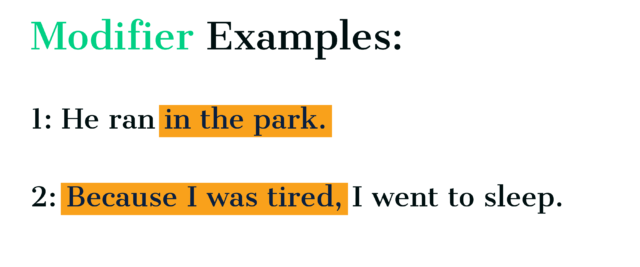
The modifiers are highlighted in yellow. Notice that each portion both adds more information and is optional. “I went to sleep” could be its own sentence, but adding “because I was tired,” adds a reason for why our subject went to seep. While incredibly short, “he ran” could also be its own sentence. Attaching “…in the park” informs us to where the subject ran.
Now that we’ve established what a modifier does, we can understand what dangling and misplaced modifiers are. In short, they are grammatical errors because they improperly modify another portion of a sentence. In other words, they don’t do their job correctly.
Dangling Modifier:
A modifier that doesn't modify (or add information to) anything.
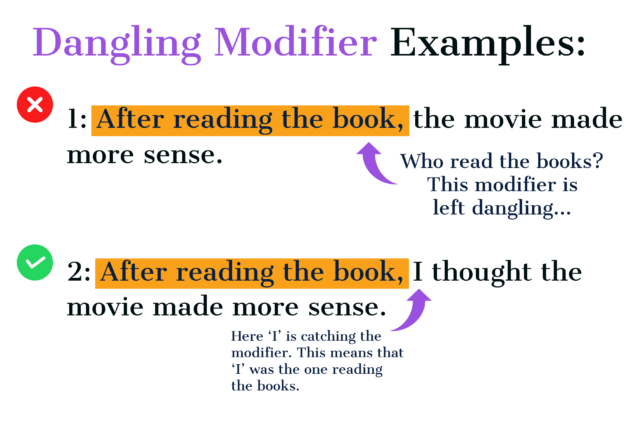
The modifiers are highlighted in yellow. Notice in example one that the sentence never specifies who ‘read the book.’ Currently, ‘After reading the book’ is modifying ‘the movie.’ In other words, the sentence can be interpreted as though ‘the movie’ had read the book (which doesn’t make sense, since a movie can’t read).
Correcting the sentence is as simple as adding a subject that can logically catch the modifier. In example 2, ‘I’ is the subject that had read the book.
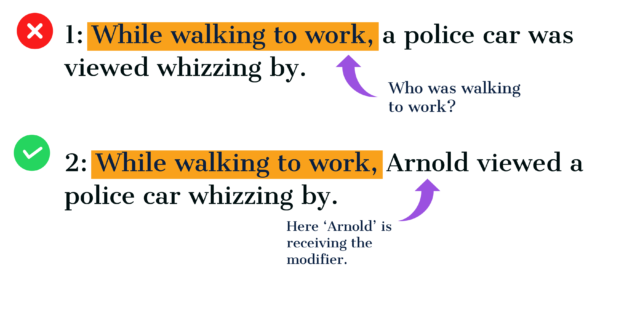
The modifiers are highlighted in yellow. In example 1, there is no logical subject to catch the modifier. Since the police car follows immediately after the modifier, we are left to assume that it is the subject. Yet, we know that a police car cannot walk. Therefore, we must add a logical subject to receive “While walking to work.” In example 2, it is clear that Arnold spotted a police car while he was walking to work.
Both examples of dangling modifiers are incorrect grammatically because they never provide us with a subject to receive the modifier. Thus, we’re left assuming what the modifier is adding information to (a movie that can read a book or a car that can walk).
Misplaced Modifier:
A modifier that modifies (or adds information to) the wrong word (or words).
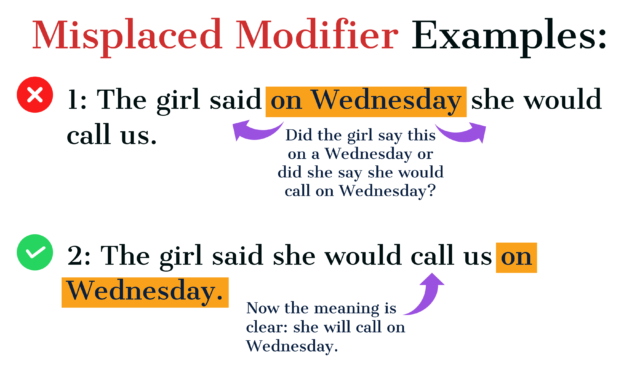
The modifiers are highlighted in yellow. In example 1, it’s unclear what ‘on Wednesday’ is modifying. Did the girl say this to the narrator on Wednesday? Did the girl mean that she would call them on Wednesday? Clarifying the sentence requires us to break apart the ideas so that it’s clear what ‘on Wednesday’ is modifying. Example 2 shows ‘on Wednesday’ is simply modifying the call. In other words, the narrator will be called on Wednesday.
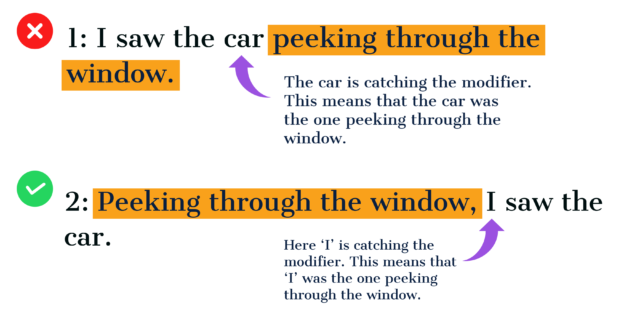
The modifiers are highlighted in yellow. In example 1, the modifier is placed immediately next to ‘the car.’ This formatting gives the impression that a car is lodged through a window. While this could perhaps be the case, it seems more likely that this is just another misplaced modifier case. The writers true intention was to state that they viewed a car when they looked through their window. Fixing example 1 just requires rearranging the main points of the sentence so that our intended subject is immediately next to its modifier. Example 2 clearly depicts that the modifier “Peeking through the window” is being performed by “I” (not the car). It also shows what ‘I’ saw when ‘I’ peeked through the window: the car.
Illogical Wording:
There isn’t a definitive way of defining “illogical wording.” Awkward sentences are usually the product of poor word choice and improper arrangement. Luckily, illogical wording and awkward sentences are usually easy to spot.

When read aloud, example 1 sounds clunky. Example 2 gets straight to the point. In standard conversation, you would say “I celebrated” and not “celebrate is what I did.” Example 1 also separates ‘celebrate’ and “the contest she won” so much that it almost appears that she celebrated for a reason other than her victory. Whereas in example 2, ‘celebrated’ is immediately modified by ‘…after she won the contest.’ Thus, example 2 is quicker to the point and clearer.
2. Questions
In the following sentences, locate the modifier.
- Having read the book, I knew the movie’s plot.
- He waltzed all night long.
- She watched TV in her bedroom.
- Leaves with beautiful colors fell off the trees.
The following sentences contain a dangling or misplaced modifier. Fix the sentence by either 1. adding a logical subject to receive the modifier (if it’s dangling) or 2. moving the modifier closer to the subject (if it’s misplaced).
- Looking up, the clouds turned dark.
- Kurt found a golden man’s watch on the floor.
- The shredded student’s book sat next to his dog.
- Having helped clean, the car headed home.
- To check his writing, each sentence was spellchecked.
- To satisfy her parents, the violin was to be practiced daily.
- I saw two bears on the way to the store.
- Chester bought a car from a vehicle salesperson with a loud engine.
3. Answers
The modifiers are in bold and italicized.
- Having read the book, I knew the movie’s plot.
- He waltzed all night long.
- She watched TV in her bedroom.
- Leaves with beautiful colors fell off the trees.
Some of the sentences below could be corrected in several different ways. Most just require a proper subject to catch the modifier.
- Looking up, the clouds turned dark.
- Looking up, I noticed the clouds turned dark.
- Kurt found a golden man’s watch on the floor.
- Kurt found a man’s golden watch on the floor.
- The shredded student’s book sat next to his dog.
- The student’s shredded book sat next to his dog.
- Having helped clean, the car headed home.
- Having helped clean, the man headed home in his car.
- To check his writing, each sentence was spellchecked.
- To check his writing, he spellchecked each sentence.
- To satisfy her parents, the violin was to be practiced daily.
- To satisfy her parents, she practiced her violin daily.
- I saw two bears on the way to the store.
- On my way to the store, I saw two bears.
- Chester bought a car from a vehicle salesperson with a loud engine.
- Chester bought a car with a loud engine from a vehicle salesperson.
